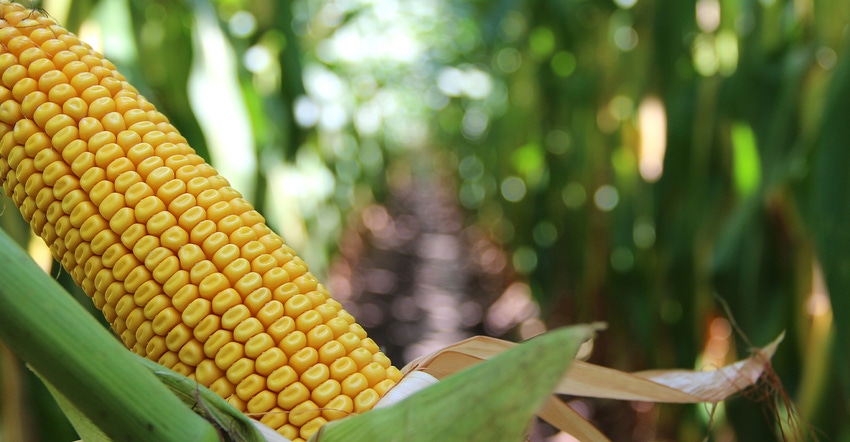
Is it worth it to use an insecticide seed treatment on field corn acres? Should I be planting Vip3A expressing corn hybrids to control corn earworm? Tyler Towles, Extension and Research Entomologist for the LSU AgCenter, answered these two questions, during the recent online Louisiana Agricultural Technology & Management Conference.
Insecticide seed treatments in corn
Seed treatments are a preventative measure for soil-dwelling insect pests such as wireworms, seed corn maggot, white grubs, and Southern corn rootworm.
"I get a lot of questions about seed treatments," Towles said. "The main question is would I recommend incorporating a seed treatment at planting, especially in field corn, and my answer is always yes. An insecticide seed treatment is a preventative measure since it is incredibly hard to scout for these pests below the soil surface. If soil-dwelling pests significantly affect field corn stand, there is no other option other than burning it down and replanting. Always go with an insecticide seed treatment when planting field corn."
Wireworms, seed corn maggot, white grubs, and Southern corn rootworm feed on corn seeds and corn roots, which can lead to stunting and even plant death.
"I analyzed a couple of years' worth of seed treatment data on different products, six to be exact, and we measured seedlings stand and yield," he said. "We looked at various rates of Poncho, Cruiser, Avicta, and Lumivia, which is a diamide insecticide seed treatment.
"Oftentimes, you are not going to see any dramatic increase in plant stand from using one of these products. However, when it comes to yield, an insecticide seed treatment can help increase your yield per acre."
According to Towles, most of the products they looked at could likely pay for themselves thanks to the small yield bump likely to occur from using an insecticide seed treatment.
"Looking at some of Dr. Don Cook's small plot research data from 2017, he lost about two-thirds of his plant stand in plots that did not incorporate an insecticide seed treatment," Towles said. "Dr. Cook had incredible corn rootworm pressure, which was unlike anything I've seen before since the widespread adoption of insecticide seed treatments. In his non treated plot, he only saw about 27 bushels per acre compared to 180, 190, or 200 bushels in all other seed treatment scenarios. I tallied yields across all of the treatments tested and took an average of what he lost by simply not including a seed treatment in his corn, and he lost around 166 bushels per acre.
"Nine times out of 10, you're not going to see significant effects by adding a seed treatment, but that one year out of 10 years may be the one that pays for all the other years. I would recommend always using an insecticide seed treatment when it comes to planting corn because, oftentimes, it pays for itself."
Three gene expressing corn hybrids
Corn earworm, also known as the cotton bollworm, is a significant pest in cotton; however, there is no significant yield loss observed in field corn acres from this pest.
"There should be no insecticide application going out to control this pest in the ear stage of field corn whatsoever," Towles said. "Research from Mississippi State University simulated corn earworm damage in the ear stage of field corn, and it took 50 to 60 kernels per ear to see a significant yield loss. In my 10 years of looking through corn ears, I've never seen anything that comes close to that, so keep in mind, you're not seeing any significant yield loss in field corn from this pest."
Data taken from 50 locations from 2014 to 2019 tested a non-Bt hybrid, a couple of two gene hybrids, and one Vip3A expressing three gene hybrid.
"What I want you to know from this research is that there were no significant differences when it came to yield whatsoever," he said. "However, looking at the Vip3A expressing three gene hybrid, yielding 186 bushels on average compared to our two gene hybrids, which both yielded 188.3 and 188.6. You are not getting any significant monetary return from planting the Vip3A protein in field corn."
From 2020 data at the Macon Ridge and Dean Lee Research Stations, there was no significant difference in yield across the different Bt and non-Bt hybrids. At the Dean Lee Station, the non-Bt hybrid yielded significantly lower than the 2 and 3 gene expressing hybrids. However, this is likely due to hybrid genetics. Nevertheless, the 2 gene expressing field corn hybrids consistently outyielded the field corn hybrids expressing the Vip3A protein.
"The reason why I am advising against planting a field corn variety that expresses the Vip3A protein is that it can negatively affect cotton," Towles said. "If you're standing in a cotton field in the middle of July or August and see bollworm moths flying around, there is a 95% chance they came from field corn. If we fill the landscape with corn hybrids that express Vip3A, we're putting an incredible amount of selection pressure on this gene, which can be detrimental to cotton.
"Insect resistance to various chemistries can occur naturally, and corn earworm resistance to Bt genes is no different. If several corn earworms survive to adulthood after feeding in Vip3A expressing field corn, these adults could likely mate and produce offspring carrying Vip3A resistance alleles. Since several popular cotton varieties are now expressing the same Vip3A genes, any offspring from these resistant corn earworm adults will likely cause damage in these cotton varieties.
"Keep in mind, you are not seeing any economic benefit from planting Vip3A corn hybrids in the mid-southern U.S. Additionally, it will likely lead to the demise of three gene cotton varieties. Based on seed prices from 2019, if you plant field corn at 34,000 seed per acre, you would be spending about $4.50 more an acre to plant a Vip3A corn hybrid, which you’re not seeing any kind of benefit from."
About the Author(s)
You May Also Like




